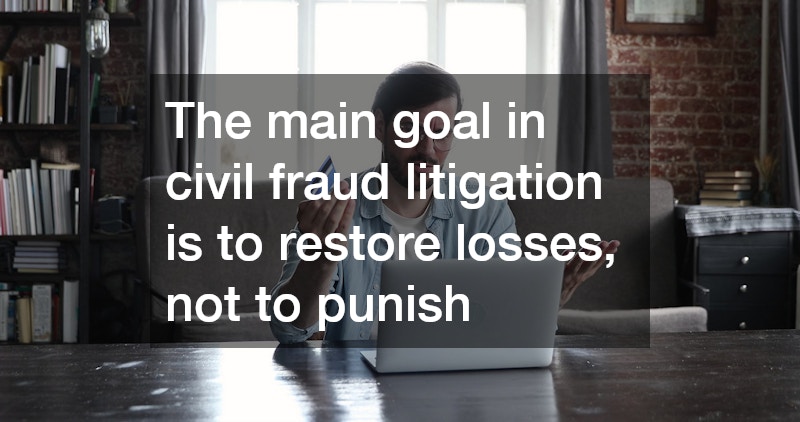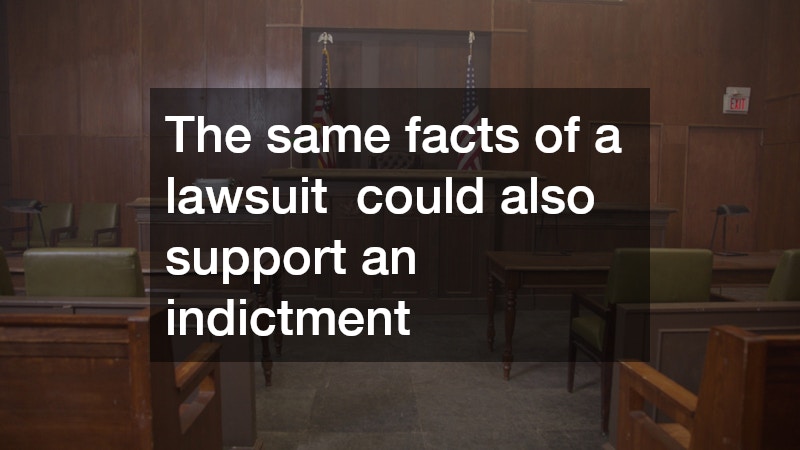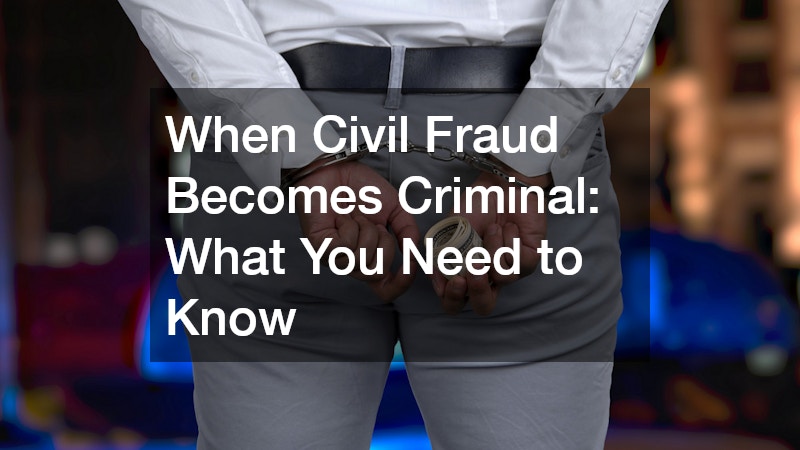Disclaimer: This website shares legal information for educational purposes only and does not constitute legal advice. Please consult a licensed attorney for advice specific to your situation.
Key Takeaways
-
The difference between civil and criminal fraud often depends on intent and scope.
-
Evidence uncovered in civil cases can directly lead to criminal prosecution.
-
Both civil and criminal penalties can occur simultaneously.
-
A qualified fraud attorney should be involved as soon as allegations arise.
-
Preventive compliance programs are the best safeguard against fraud liability.
-
Managing communications and documentation properly is essential to avoid self-incrimination.
Fraud law is one of the most complicated areas in the legal system because it touches both civil and criminal liability. A single act—such as falsifying information or misrepresenting facts—can result in a private lawsuit, a regulatory investigation, or even criminal prosecution. What begins as a dispute over money or contract terms can evolve into a serious case carrying the possibility of prison time.
For businesses, professionals, and individuals alike, understanding when civil fraud becomes criminal is critical. The difference between these two categories lies mainly in intent, impact, and the laws violated. Once prosecutors believe that a person intentionally deceived others for unlawful gain, what might have started as a civil matter can quickly turn into a criminal case.
This in-depth guide explains how civil fraud differs from criminal fraud, how one can lead to the other, and what steps defendants can take with the help of an experienced fraud attorney to protect their rights.
Understanding Civil Fraud
Civil fraud occurs when one party deceives another, leading to financial loss or contractual harm. These cases are usually initiated by private plaintiffs—such as consumers, investors, or companies—rather than by the government. The main goal in civil fraud litigation is to restore losses, not to punish.
A civil fraud lawyer helps clients pursue or defend these claims by establishing—or contesting—that someone made intentional misrepresentations or concealed facts that another party relied upon to their detriment.
Common Examples of Civil Fraud:
-
Contractual misrepresentation: One party lies about key details—such as financial condition or business capacity—when entering an agreement.
-
False statements in loan or insurance applications: Applicants exaggerate income, assets, or damages to obtain funds or benefits.
-
Fraudulent inducement: A person intentionally misleads another into signing a contract or investment deal.
-
Concealment of material facts: Withholding essential information during a sale, merger, or property transaction.
-
Misuse of investor funds: Diverting capital for unauthorized purposes without disclosure.
Civil fraud cases operate under the “preponderance of evidence” standard, meaning that the evidence must show it is more likely than not that fraud occurred. Because the burden of proof is lower than in criminal cases, civil fraud lawsuits are often the first step before any government involvement.

Legal Remedies in Civil Fraud:
-
Compensatory damages: Financial recovery for losses suffered by the victim.
-
Punitive damages: Additional payments meant to penalize particularly egregious conduct.
-
Rescission: Canceling or voiding fraudulent contracts.
-
Restitution: Returning money or property obtained through deception.
-
Injunctions: Court orders to prevent further misconduct.
A civil fraud attorney focuses on gathering evidence, handling discovery, and negotiating settlements to either recover damages or prevent escalation to a criminal matter. However, if evidence uncovered in a civil case indicates intentional wrongdoing, it may be referred to law enforcement—turning a private lawsuit into a criminal investigation.
Understanding Criminal Fraud
Criminal fraud is prosecuted by the government, typically through federal or state prosecutors. Unlike civil cases, which are designed to compensate victims, criminal fraud aims to punish and deter unlawful behavior. The key distinction is criminal intent—a deliberate effort to deceive for personal or financial gain.
A criminal fraud attorney represents clients accused of such violations and ensures that their constitutional rights are protected throughout the investigation and trial process.
Common Types of Criminal Fraud:
-
Wire fraud: Using electronic communication (emails, online transactions) to carry out deceptive schemes.
-
Mail fraud: Sending fraudulent materials or false claims through postal services.
-
Securities fraud: Providing misleading financial data to investors or manipulating markets.
-
Healthcare and insurance fraud: Submitting false claims or inflating billing information.
-
Tax fraud: Falsifying returns or hiding income to avoid taxes.
-
Banking and mortgage fraud: Misstating income, assets, or debts in order to secure loans.
-
Identity theft and credit card fraud: Using someone else’s personal or financial information to obtain benefits.
To convict someone of criminal fraud, prosecutors must prove beyond a reasonable doubt that the accused intentionally misled others. Penalties vary based on the scope of the scheme, the amount of money involved, and whether federal agencies like the SEC, IRS, or DOJ are involved.
Criminal Penalties Can Include:
-
Long prison sentences—sometimes decades for large-scale fraud schemes.
-
Substantial fines and restitution orders.
-
Seizure of assets and forfeiture of ill-gotten gains.
-
Probation or supervised release following imprisonment.
-
A permanent criminal record that can affect future employment and reputation.
A seasoned criminal fraud lawyer’s role is to investigate the government’s claims, challenge intent and evidence, and advocate for reduced or dismissed charges.
The Overlap Between Civil and Criminal Fraud
Fraud often falls into a gray area where a single act can violate both civil and criminal laws. A civil fraud attorney may initially handle a dispute that later attracts attention from regulatory or prosecutorial agencies. The same facts that form the basis of a lawsuit for damages could also support an indictment.
Examples of Overlapping Scenarios:
-
Investment fraud: Investors file civil suits for misrepresentation, while the SEC or DOJ pursues criminal securities fraud charges.
-
Insurance misrepresentation: A policyholder faces a civil claim for reimbursement and later becomes the target of a criminal fraud case.
-
Corporate accounting manipulation: Shareholders bring a civil suit for losses, and federal prosecutors file criminal charges for securities violations.
-
Government contract fraud: A company faces civil penalties under the False Claims Act while the DOJ launches a criminal probe.
Even if someone settles a civil lawsuit or wins it, the same conduct can still result in criminal prosecution later if the government determines that intentional deception occurred. Fraud defense lawyers often warn clients that statements made in civil court can later be used against them in criminal proceedings.
How Civil Fraud Escalates Into a Criminal Case
A civil dispute becomes criminal when evidence reveals deliberate deceit, intent to defraud, or harm to the public or government. Fraud defense attorneys often see escalation happen through a series of predictable stages.
The Escalation Process:
-
Civil Lawsuit or Investigation Begins
-
A private party alleges misrepresentation or deceit.
-
A civil fraud lawyer responds by defending the claim and managing discovery.
-
-
Discovery Uncovers Criminal Conduct
-
Documents, testimony, or financial records reveal patterns of intentional falsification.
-
Evidence shows deliberate concealment, falsified books, or digital manipulation.
-
-
Referral to Law Enforcement
-
The court, plaintiff, or regulator refers findings to agencies such as:
-
The Department of Justice (DOJ)
-
The Securities and Exchange Commission (SEC)
-
The Internal Revenue Service (IRS)
-
State attorneys general or district attorneys
-
-
These agencies evaluate whether the civil matter meets criteria for criminal prosecution.
-
-
Criminal Investigation and Charges
-
Prosecutors open a parallel investigation using the evidence gathered in civil discovery.
-
If sufficient proof of intent exists, criminal charges are filed.
-
The defendant must now coordinate with both civil and criminal fraud attorneys to manage the cases.
-
-
Parallel Proceedings
-
Civil and criminal cases may proceed simultaneously.
-
Defendants must balance cooperation in civil discovery with the Fifth Amendment right against self-incrimination.
-
Statements made in depositions can later appear in criminal indictments.
-
Fraud defense lawyers emphasize that timing and strategy are crucial. How a defendant responds in early civil proceedings can determine whether prosecutors pursue criminal charges.

Legal Consequences for Defendants
When civil fraud becomes criminal, the stakes rise exponentially. The same conduct can now trigger punishment rather than just repayment.
Civil Penalties:
-
Repayment of losses and legal costs.
-
Court-ordered fines or injunctions.
-
Loss of business licenses or certifications.
-
Damage to business and personal reputation.
Criminal Penalties:
-
Jail or prison sentences depending on the scale of the fraud.
-
Massive fines, restitution, and forfeiture of assets.
-
Probation or community service.
-
Long-term criminal record with professional consequences.
Collateral Consequences:
-
Exclusion from government contracts or public tenders.
-
Ineligibility for certain professional or financial roles.
-
Loss of certifications in accounting, law, finance, or healthcare.
-
Lasting reputational harm that can destroy careers or businesses.
While double jeopardy prevents two criminal trials for the same offense, civil and criminal fraud cases can legally coexist because they serve different purposes—one compensates, the other punishes. This means defendants can face both types of consequences simultaneously.
Defense Strategies When Facing Potential Criminal Escalation
The best defense against criminal escalation is proactive preparation. A fraud attorney who specializes in both civil and criminal defense can help manage exposure early.
Key Strategies:
-
Immediate legal intervention:
Retaining a fraud attorney as soon as a civil fraud claim is filed helps control the narrative, preserve evidence, and avoid missteps. -
Strategic communication:
Limit statements to regulators or opposing counsel that could be misinterpreted as admissions of intent. All communication should go through counsel. -
Careful document handling:
Ensure all requested documents are preserved and produced legally. Altering or destroying records can lead to obstruction charges. -
Expert analysis:
Forensic accountants, data analysts, and industry specialists can review evidence and challenge the interpretation of financial discrepancies. -
Intent defense:
Argue that errors were clerical, negligent, or based on misunderstanding rather than deliberate deception. -
Negotiated resolution:
Explore settlements or cooperation agreements that limit exposure to criminal liability. A civil settlement doesn’t guarantee immunity but may influence prosecutorial discretion. -
Parallel defense coordination:
When both civil and criminal proceedings are underway, defense teams must synchronize strategies to avoid conflicting statements or evidence.
An experienced fraud defense lawyer evaluates every stage of the case—civil and criminal—to protect the client from escalation, mitigate penalties, and preserve professional standing.
Real-World Examples of Escalation
Several high-profile cases demonstrate how civil disputes can turn into criminal prosecutions:
-
Securities Fraud Cases:
Civil lawsuits by investors often uncover falsified reports or insider trading, prompting the SEC to initiate criminal proceedings for securities fraud. -
Healthcare Billing Schemes:
Hospitals or clinics facing civil suits under the False Claims Act frequently see those same allegations evolve into federal criminal prosecutions when intent to defraud Medicare or Medicaid is established. -
Tax and Accounting Fraud:
A civil audit revealing falsified books or offshore accounts can lead to IRS criminal charges for tax evasion or conspiracy. -
Insurance Fraud:
Civil suits from insurers alleging false claims may prompt state prosecutors to open criminal cases if the pattern of deceit affects multiple claims or large sums of money.
These examples illustrate why individuals and companies should treat even small civil fraud allegations with utmost seriousness and engage a fraud attorney early in the process.
Preventing Civil or Criminal Fraud Allegations
Prevention is always more effective than defense. Implementing ethical business practices and compliance systems can dramatically reduce the risk of being accused of fraud.
Preventive Steps for Businesses:
-
Establish compliance programs:
Develop internal controls for accounting, contracts, and reporting to prevent misconduct. -
Conduct internal audits:
Regularly review financial records and operational processes to detect irregularities early. -
Promote ethical culture:
Train employees on reporting concerns and following transparency protocols. -
Engage legal counsel for complex transactions:
A civil fraud lawyer can review contracts and disclosures to identify potential risks before signing. -
Implement whistleblower channels:
Encourage internal reporting of unethical behavior before it reaches regulators.
Preventive Steps for Individuals:
-
Be truthful in all applications and disclosures.
-
Keep thorough, organized documentation of financial and contractual dealings.
-
Consult a fraud attorney before responding to subpoenas or audit requests.
-
Avoid making statements or settlements without legal guidance.
Even if an investigation begins, early cooperation and professional representation can often prevent escalation to criminal charges.
The boundary between civil and criminal fraud is finer than most people realize. A simple misrepresentation can evolve into a criminal investigation if prosecutors believe there was intent to deceive. Whether you’re a business owner facing a contractual dispute or a professional under audit, understanding this overlap is vital.
Working with an experienced fraud attorney can make the difference between resolving a civil claim quietly and defending against criminal charges in court. With proper legal guidance, careful communication, and preventive measures, individuals and businesses can protect themselves from the devastating consequences of fraud allegations.
